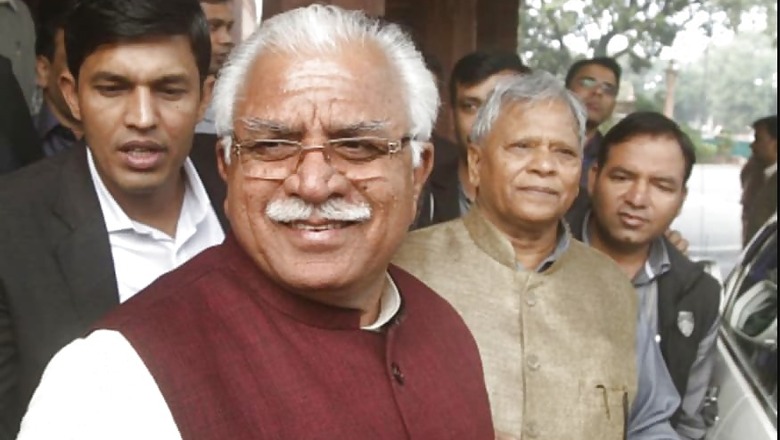
views
New Delhi: The Haryana government’s announcement of waiving interest and penalty worth Rs 4,750 crore on crop loans received backlash with many calling the move a “stunt” ahead of the state elections in November.
On Monday, Chief Minister Manohar Lal Khattar announced in Bhiwani district that 10 lakh farmers, who took loans from the state-owned Primary Agriculture Cooperative Society (PACS), District Cooperative Central Bank (DCCB) and Land Mortgage Bank (LMB) and have failed to repay, will receive interest and penalty waiver.
The chief minister said loans of about 8.25 lakh farmers who borrowed from PACS, 32,000 farmers who borrowed from DCCB and 70,000 farmers who borrowed from LMB have become non-performing assets (NPA) or bad loans. The waiver would free the farmers of the accruing penal interest on the principal amount.
However, Rakesh Kumar Bains of the Bharatiya Kisan Union told News18 that this waiver doesn’t do much for the state’s farmers who are drowning in an ocean of debts and failed crops. “The farmers of Haryana demanded that their entire loan be waived. But the government only waived loans taken from cooperative banks. How will the farmer benefit from this? Loans from national banks where from most farmers go have not been included in this,” he said.
Bains said a majority of the farmers have their Kisan Credit Cards issued by national banks. “Farmers take loans against these cards for various utilities — from tractors, pesticides, farming equipment to irrigation. The Haryana government hasn’t taken any step for those availing services under a national scheme,” he added.
Jaswinder Singh, a farmer based in Shahabad, Kurukshetra district, said the move was a stunt ahead of the elections and hardly had any real positive impact on aggrieved farmers.
“I have a loan of Rs 90,000 from a cooperative bank. But I benefit nothing from the state government’s waiver. The benefit only goes to defaulter farmers who have been unable to pay the installments against the loans they have taken. And they also don’t benefit anything from this because to avail the waiver they have to pay the principal amount of the loan. If they had that money, they wouldn't have missed the installment in the first place,” he said.
“Most of the bad loans are in national banks. There is not a single farmer in Haryana who doesn’t owe money to a national bank,” he said. Cooperative banks mostly give out small loans of maximum Rs 90,000 and a significant part of it is given in cash, while national banks give loans of at least Rs 1 lakh on land holdings of 1 acre or more. The amount is higher for larger land holdings.
Despite multiple attempts, the state agriculture minister and director of agriculture and farmers welfare department could not be reached for response. Although the new announcement will benefit several farmers, it fails to address the larger gap in agriculture policy, said Devinder Sharma, a senior food and trade policy analyst.
“The current policy of declaring a loan as an NPA in the agriculture is the same as in the industrial sector: failure in payment of installments marks a bad loan. Within this policy framework, the farmer is always stuck in the cycle of debt.”
“A better option would have been to add this amount to the existing PM-Kisan providing direct income support to farmers and also include landless farmers,” he added.
According to Sharma, Kerala’s model to deal with farmer debt via the Kerala State Farmer’s Debt Relief Commission is what other states should aim for.
The commission, set up in January 2007 in the aftermath of a spate of farm suicides, accepts debt relief applications from farmers and can waive up to 75 per cent of the same. A bench hears the applicant’s plea and decides the verdict based on a whole range of factors. Until May 2018, the commission has received 4,40,801 applications.




















Comments
0 comment